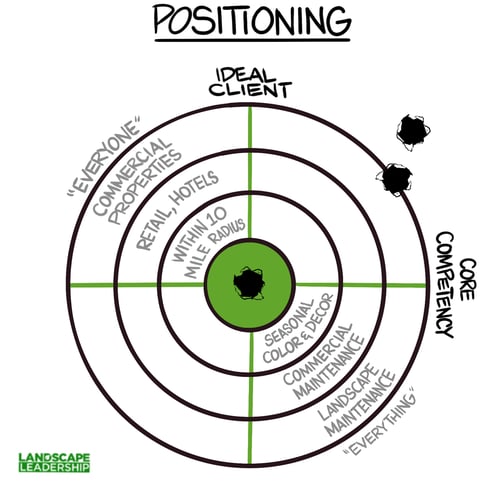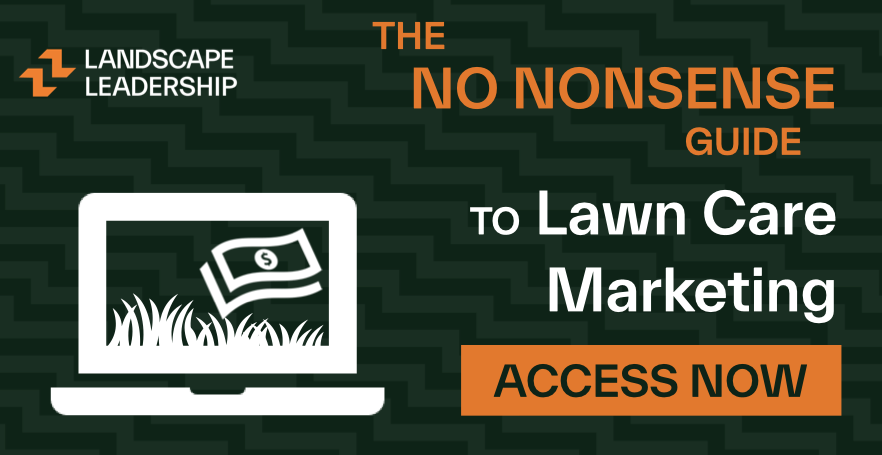Topics: Branding And Positioning
4 Additional Ways to Position Your Company (and Create a Unique Selling Proposition)
 Author: Chris Heiler
Author: Chris Heiler
To be "well positioned" is to be known for something. That is, unique in the mind of your prospects and customers.
In contrast to this are the majority of companies in the lawn and landscape industry who are undifferentiated and indistinguishable from each other. "Just Another Landscaper", as I like to say.
As I'm sure you're well aware, many companies in our industry – maybe even you – are not making the money they could be. A lack of profitability is a symptom of a positioning problem and a weak – or non-existent – unique selling proposition (USP).
Making more money (i.e. profit) begins with a thoughtful positioning strategy for your business. Only in rare cases does it happen by accident.
A quick review
 There are three primary ways to position your company in the marketplace:
There are three primary ways to position your company in the marketplace:
League of Rebels is a bespoke and ready-to-wear mens clothier here in Austin, TX. The Deck, in London, provides the same custom tailoring services, only to women. To be vertically positioned is to have a well-defined ideal client.
2. Horizontal positioning- You position your company around a core competency, typically a specialization or expertise. Our friends at Simpson Landscape in Plano, TX are known for their seasonal color displays. You may have a specialization like green roof design or organic lawn care. I know a company that specializes in roadside and retention pond cleanup (not sexy... but very profitable).
3. Combination of vertical and horizontal positioning- Your company offers specialization or expertise to a specific industry or audience. This is the best way to position yourself. A company offering swimming pool maintenance and repair specifically to hotels and apartments would be an example of this.
Look at the illustration above. See that bullet hole in the center of the target? That's where your maximum profit potential is. Unfortunately, as I've explained, most companies in our industry are missing the target (and profits) because they are offering everything to everyone.
A common question to address
I've had many conversations over the years with companies offering everything to everyone. After all, this is the typical model in the landscape industry. A common question is this:"Like most of our competitors, we're a full-service company for residential and commercial properties. Do we have to have a speciality or expertise? Can't we be known for something else??"
Let's dig into that "something else" together.
My first response would be, ideally, that your company would have a core competency to hang your hat on. At Landscape Leadership we help companies like you with your landscaping and lawn care marketing. That's our core competency and what we're known for. You might be a badass at building retaining walls or installing sod.
But if you don't have a core competency like this...
From my experience there are two traits that companies think they can hang their hat on when it comes to their USP. The first two on the table are always...
1. Quality, and...
2. Customer service
This is a big mistake.
Both are highly subjective and, nowadays, expected from your customers. Not to mention, these characteristics are what your competitors are most likely rambling on about because they haven't figured out what really makes them unique either.
So, what can you build your positioning around if you don't offer a specialization or expertise?
Here are some thoughts...
Price
You can stake out a position at the low end of the market or the high end.
It's not as easy as simply setting your prices below those of your competitors though. Southwest Airlines has positioned itself as the "low fare, no frills airline". While they do offer attractive lower prices for their flights, they differentiate themselves in other ways that appeal to their customers too. In other words, they're not just cheap.
Dollar General is another example of a successful company positioned around offering low prices (taking their queue from Walmart).
Both of these companies also understand how to keep their operational costs down compared to competitors. And they have an advantage you do not: SCALE.
This is an important point to keep in mind. Whether you aim down market or up market you better have other compelling points of differentiation, otherwise you'll be perceived as either "cheap" or "overpriced".
For this reason I do not recommend building a positioning strategy around how you price your services.
Convenience
For some companies I think convenience is a great way to differentiate yourself and build a unique selling proposition for your company.
When I think of convenience and "ease of doing business" companies like Peloton and Carvana come to mind.
If I owned a lawn care company I would position it as "the easiest lawn care service to do business with".
People pay for convenience. They'll happily give you their money if you make it easy for them.
Size
You can differentiate your company based on your size of operation. This goes both ways; you can play up being big or small.
Brightview uses their size and reach to their advantage. In their case, "size" really equates to being "the safe choice" for many risk-averse commercial property managers around the country.
This approach could potentially work for you as well, but you better be one of, if not the biggest company, in your market.
In contrast to this, some companies are able to play the "boutique" card to their advantage which enables them to standout. To some, "small" can equate to a more personable and desirable experience.
Our client, North By Northwest, offers commercial landscape maintenance services and competes head to head against companies much larger than them. They play up the fact that they are a small, multi-generational family-run business.
Sometimes it's best to acknowledge reality and use it to your advantage.
Full-Service
I'm adding "full-service" here because, inevitably when I talk with a company about positioning and suggest they offer less, they bring up another company who offers everything under the sun and holds them up as the model of what a successful business looks like.
"Full-service" can be your differentiator when you're a company like ABC Home & Commercial Services in Texas. They are the closest I've seen to full-service, offering lawn care, irrigation, pest control, AC and heating, electrical, cleaning, and a helluva lot more I don't feel like listing.
Using full-service as your USP is similar to using "size" as your trump card. You better offer more than anyone else in your market, as ABC Services does. As I said about size, full-service can also equate to being the "safe choice" for certain customers.
Full-service can also be seen as being more convenient. Some customers want a single provider. That's what ABC Home & Commercial Services can hang their hat on. They aren't creative... they're convenient. And they're friggin' big. They are a safe and convenient choice for many.
From my perspective, "full-service" is typically a lazy choice, not a strategic one (like ABC). Just because it works well for a handful of companies does not mean it can work for you as a positioning strategy.
Let's recap
Alright, I feel like I rambled a bit. Let's see if I can summarize my insights for you...
- The best way to differentiate yourself with a unique selling proposition (USP) is to offer a specialization or expertise to a highly targeted market (ex- landscape maintenance for homeowner associations).
- Don't bother trying to differentiate yourself based on quality of work or your customer service. Same goes for price.
- Only very few companies can position themselves based on their size or the fact they are full-service. You are probably not one of them, so find something else to build your USP around.
- I think "convenience" is where the money is (ex- Netflix, Peloton). How can you make it easier for your customers to do business with you?
You need to be known for something. Otherwise, you're Just Another Landscaper indistinguishable from your competitors. That's not a good place to be.
---
Have you subscribed to our blog yet? We have almost 5,000 subscribers now; all lawn and landscape industry professionals just like you. You can subscribe here or just add your email address in the form below.





